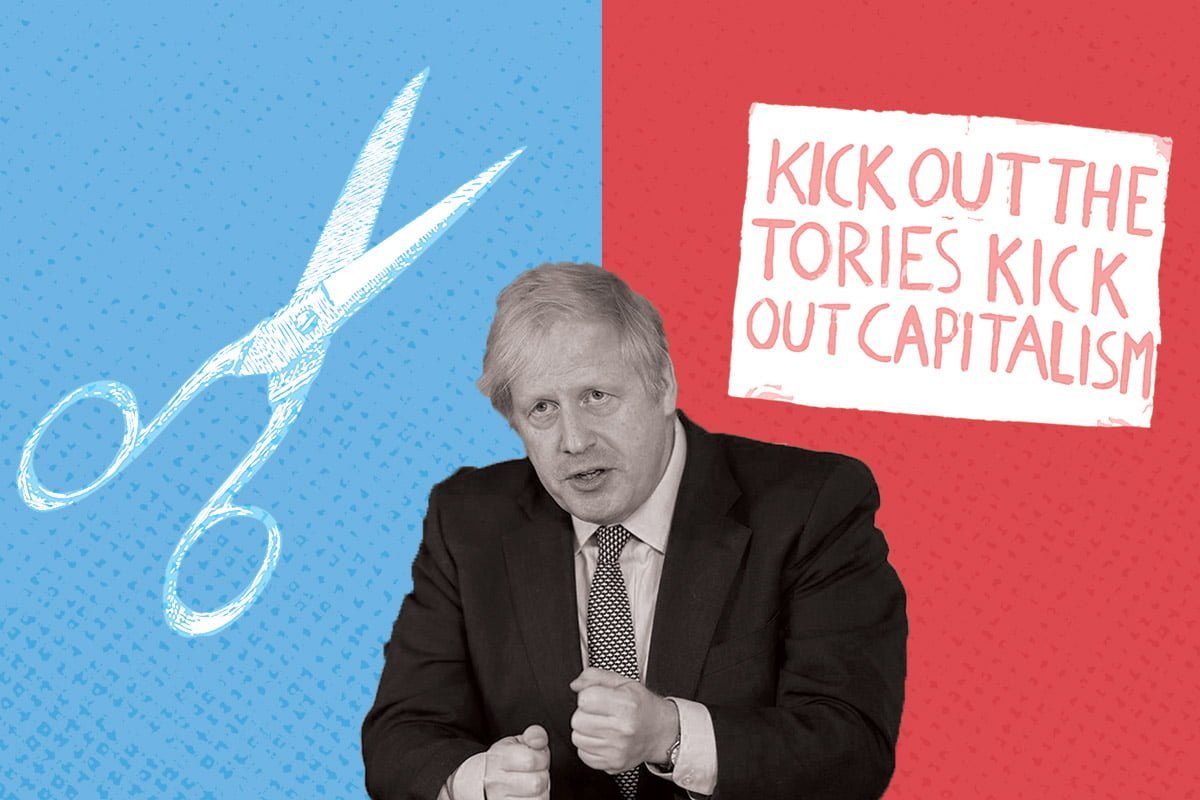As the crisis deepens, the working class is facing a tsunami of austerity and attacks – from cuts to Universal Credit, to rising energy bills, to the scourge of ‘fire and rehire’. The Tories are sitting atop a powder keg that is ready to explode.
Ever since their election victory almost two years ago, Boris Johnson and the Tories have tried to convince voters that ‘austerity is over’. And many commentators, including some on the left, have bought into this idea.
Supporters of this view point to the massive state interventions in the economy seen during the pandemic, such as the furlough scheme, undertaken to prevent total economic collapse and social upheaval.
At the same time, they cite the government’s apparent new-found enthusiasm for industrial policy and protectionism, as exemplified by Brexit and by the Prime Minister’s pledge to ‘level up’ through state investment in former ‘Red Wall’ constituencies.
Recent events demonstrate, however, that austerity is far from over. Far from seeing peace and prosperity, the stage is set for a sharpening of the class struggle. The working class – and their organisations – must prepare for battle.
Business as usual

For starters, there is the imminent removal of the £20 per week uplift to Universal Credit, which will cost as many as six million families £1,502 a year.
When Tory Work and Pensions minister Baroness Stedman Scott was asked if the government had bothered to assess the impact of this cut, she replied that: “We have no obligation to conduct an impact assessment as we’re returning to business as usual.”
‘Business as usual’ for capitalism in its period of senile decay, in others words, means not Keynesianism and reforms, nor a renewed period of economic growth, but austerity and attacks on workers, the poor, and the youth.
Tax on workers
Elsewhere, some have interpreted the recent tax increase to raise funds for the NHS and social care as proof that Johnson’s Tories are a profoundly different party to what they once were; that they have become a ‘tax and spend’ party like ‘Old Labour’.
In fact, it proves the exact opposite. Instead of taxing the rich, it is workers who are being taxed. This is nothing but a continuation of the ruling class’ policy of making workers pay for the crisis of capitalism.
In any case, the increase in funding for health and social care remains far short of what is needed, with no plans to fill the 170,000 staffing vacancies in care homes; and nowhere near enough money to replace the £8bn cut to council care budgets seen during the previous decade of austerity.
Government of the rich

These cuts and taxes, in turn, are already leading to splits and divisions within the Tory Party. The Northern Research Group, for example, composed of new, ‘Red Wall’ Conservative MPs, has urged the government not to implement the planned cut to Universal Credit.
Amongst the public, meanwhile, 51 percent are against this cut, whilst only 22 percent are in favour. Even 40 percent of Tory voters are against this cut, compared to 33 percent in favour.
Despite this opposition, however, this cut is set to go ahead. In other words, this government crooks and charlatans is carrying out decisions in the interests of big business – and not any populist ‘anti-austerity’ programme, as they would have us believe.
Crisis and cuts
Further evidence for this can be seen across the board.
In spite of the headlines about ‘levelling up’, for example, the Tories’ most recent budget actually contained an 8.5 percent cut to most departments. The furlough scheme is coming to an end, putting hundreds of thousands of jobs at risk. And despite pledging that no leaseholders would have to pay for re-cladding their flats as a result of the Grenfell disaster, in the end it turns out they will have to stump up the cash.
Similarly, Downing Street has made it clear that they would rather see household energy bills rise than take the big utility companies into public ownership. The government’s education catch-up plan, meanwhile, consists of a pathetic £50 per pupil. And under Boris’ regime, one in 10 workers are thought to be facing predatory fire-and-rehire attacks.
Far from entering a new epoch of Keynesianism and big government in the aftermath of the most devastating recession in history, then, we are seeing a return to all the austerity policies of the so-called ‘neoliberal’ era. This is the new ‘normal’ facing the working class.
New epoch – same rotten system

We are in a new epoch. This is not characterised by the ‘end of austerity’, however, but by deeper crises, greater instability, and sharper class struggles.
What really defines this period is the fact that the ruling class is split and has no real plan.
At the start of the pandemic, governments across the world were forced to open the taps and spend, in order to prevent a social explosion.
Now, one wing of the ruling class demands a return to austerity, anxiously pointing to the huge amounts of debt that has piled up. Another wing points out that such policies will cause social unrest, as anger bubbles over. Both are right.
These divisions have existed ever since the 2008 crash. But they are now becoming more pronounced, as the crisis intensifies.
Instead of offering ‘constructive opposition’, or seeking to cosy-up to the current residents of Downing Street, the leaders of the labour movement must take advantage of these splits and divisions, and mobilise workers against the bosses’ offensive.
The rotten capitalist system offers no future to workers and youth. The cupboard is bare; and even the gains of the past are being taken away, through cuts and privatisation.
The only way out of this impasse – the only alternative to austerity – is to organise to kick out the Tories, and kick out capitalism. And this means building the forces of Marxism, and joining the struggle for socialism.






